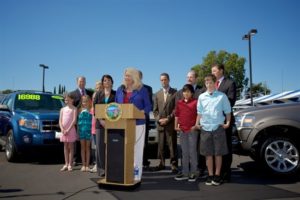In June 2011, a group of Republican lawmakers gathered at a Ford dealership in downtown Sacramento for a celebratory press conference.
 They were gathered to celebrate what they were calling, “Freedom from Higher Taxes Day,” the day when temporary tax increases were enacted in 2009 as part of a tough budget deal.
They were gathered to celebrate what they were calling, “Freedom from Higher Taxes Day,” the day when temporary tax increases were enacted in 2009 as part of a tough budget deal.
Led by then-Assembly Republican Leader Connie Conway, Republicans successfully resisted efforts by then-Gov. Jerry Brown and legislative liberals to go along with a $58 billion tax increase proposal. When the clock struck midnight on July 1st, the average family of four saw an immediate $1,040 in annual tax relief.
What a difference eight years makes.
On July 1st, Californians won’t celebrate freedom from higher taxes – they’ll be punished with even higher taxes. The state’s gas tax will go up another 5.6 cents per gallon on that day.
According to a Los Angeles Times analysis, Golden State drivers will henceforth pay the nation’s highest gas taxes at roughly 57.8 cents per gallon based on the current average price of gas in the state, surpassing Pennsylvania at 57.6 cents per gallon. This is yet another number one ranking that not too many Californians will be celebrating.
Surely, we’ll be getting the nation’s best, most efficient, and smoothest roads and highways for the increased gas taxes we’ll be paying? Not exactly.
Most of the money in the SB 1 gas tax increase is going toward road and highway repair – and other purposes like transit. While this is important, not much of the money is going to relieve highway congestion. In fact, as you’ve noticed when driving on Bay Area freeways in particular, the only real SB 1 money for highway expansion is limited to new toll and carpool lanes.
Some of the money is also being spent to put California on a so-called “road diet” – taking away critical lanes to reduce traffic congestion and instead replacing them with bike lanes.
I’ve seen this first-hand in midtown Sacramento, where one lane on J Street – one of the city’s busiest streets – has been taken over by a bike lane and a reconfiguration of street parking. Not only has this increased traffic gridlock at peak commute times, both motorists and bicyclists are at greater risk of being hurt with the new road configuration. I know I’ve had a few near misses trying to dodge cars and bicyclists while parking my car for work.
Assemblyman Vince Fong, R-Bakersfield, recently said of the road diet push that, “when people find out that it is gas tax money being used for that, there is a lot of frustration.”
Unlike eight years ago, only Sacramento’s big spenders will be celebrating on July 1st, looking forward to spending your tax dollars on their pet projects. Their gift to California drivers is something we can’t return – a bigger bill the next time we go fill up our cars.
Tim Anaya is the Pacific Research Institute’s communications director.
